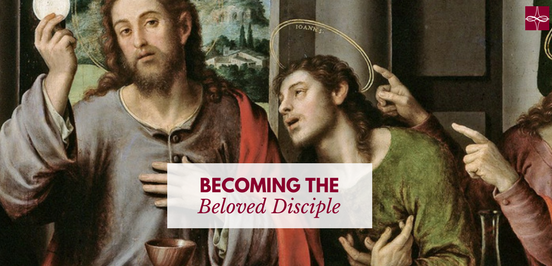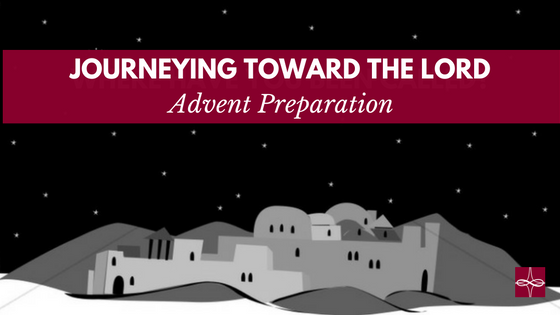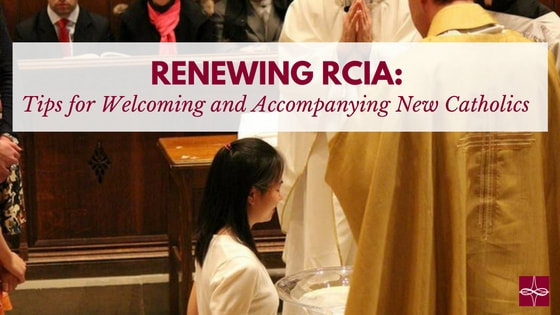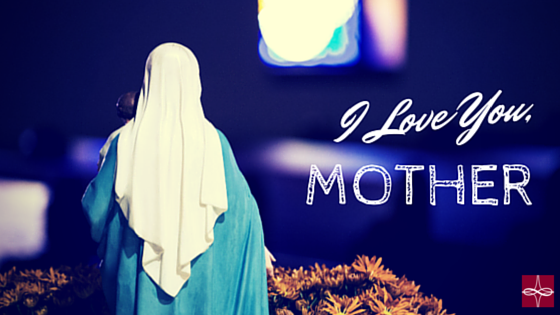|
In 61 days, I will no longer have my maiden name, will no longer have to mark “single” on tax forms, and will be the happiest girl in the world. This is because I will marry my best friend at our parish in front of our family and friends, and thus become man and wife. But before we’re retired and sitting together on the porch swing celebrating many years of happy marriage, my fiancé and I have some work to do.
The journey of preparing in mind, body, and soul for the vocation of marriage has been an eventful one. Wedding planning isn’t easy. It has tested our patience and our communication skills. But on that Saturday afternoon 61 days away, when we commit ourselves to each other, we are making a statement. In our profession of vows, we will be showing the people in attendance that Christ is a central part of our lives, and that God is at the center of our relationship. Throughout our ceremony, we are inviting our guests to reflect on God’s love for them and to join us in sharing our faith as the Body of Christ. Sacraments are meant to bring people closer to Christ. Those present will witness this sacrament from wherever they are in their walk of life and faith journey, and hopefully have an encounter with God. We look forward to providing a moment of evangelization as missionary disciples through our marriage. My fiancé and I have learned a lot from the example of married friends and family who live out their Catholic faith. One couple that recently welcomed an addition to their family has been instrumental in answering questions we’ve had about what happens next and giving us advice throughout our marital preparation. They’ve helped my fiancé and I better understand what it means to be a young and newlywed couple, juggling jobs, obstacles, and life events, and doing it all with faith in God. They and so many others have shown us what it means to live out marriage with love for God and each other. In the Archdiocese of Washington, two other couples have been examples of commitment and love. Ephraim and Sussie, who have been married for 25 years, and Bob and Laurin, who have been married for 75 years, talk about their love stories and how they cherish each other to this day. Couples like these have had to work hard at their marriage through good times and bad—just as we will. Through it all, they keep God at the center of their relationships. During these next 61 days, I will pray for my future husband, for myself as a wife, and for God’s grace to be present through it all. We will work at our marriage, this is for certain—and it won’t be easy. But with communication, understanding, forgiveness, and prayer, we will make it. During the Pre-Cana course we attended a few months ago, we learned a few things about communication and prayer that I would like to impart to anyone, whether you are in a relationship, have great friendships, or are several years into your marriage. My fiancé helped me create a list of the top ten things that stuck out to us. I hope they help you, too!
For more resources on Marriage and Family, click here. Questions for Reflection: How can the example of married and engaged couples help those discerning marriage? Are there people in your life that you look to as witnesses of fruitful marriage?
0 Comments
"I will give them a new heart, and put a new spirit within them." -Ezekiel 11:19 I hold my son Leo closely, rocking him back and forth in the quiet of the night. He throws his head back, pushes against me, and babbles to keep himself awake. As his mother, I must be patient and persistent. The fruit of my efforts results in his deep breathing, dangling arms, and heavy eyelids. Leo is now ten months old—crawling, pulling himself up, climbing. While he still looks to me for assurance and affirmation, he much prefers exploration to stillness. Not wanting to miss a thing about this big world, he wrestles with me as I put him down for naps and at bedtime. I often think as I sing to Leo and soothe him to sleep: This is how I am with God. I wrestle with him, pushing back, filling my life with distraction. I prefer my will—my way—to his own. I forget to rest in his stillness. In my graduate program, a professor once shared a particularly beautiful insight that still strikes me today. He said that if two human beings rest long enough on each other’s chests, their hearts sync up and beat in rhythm with one another. As a mother, this insight is especially poignant and beautiful to me—I think of my son’s heart slowing down and mine speeding up to embrace and beat as one. Then I apply this truth to God: have I allowed myself to rest in him? Do our hearts beat as one? The Gospels tell us that John, the Beloved Disciple, reclined on the chest (kolpos in Greek) of Christ at the Last Supper. Applying my professor’s insight to the Gospel, we can gather from this image that John’s heart beat in time with Christ’s, whose own heart beat perfectly with his Heavenly Father’s. As Christians, we are all called and invited to become the Beloved Disciple. This is not a privilege for a select few. Resting on the kolpos of Christ and allowing our hearts to beat in time with his gives our lives true meaning and fulfillment. As Pope Francis said, “The Heart of the Good Shepherd tells us that his love is limitless; it is never exhausted and it never gives up. There we see his infinite and boundless self-giving; there we find the source of that faithful and meek love which sets free and makes others free; there we constantly discover anew that Jesus loves us even to the end’ (Jn 13:1), without ever being imposing.” This intimacy with God, however, does not happen overnight. The Gospel does not say that John rested on the chest of Christ right after Jesus called him to discipleship on the Sea of Galilee. This intimacy was the fruit of years spent in the presence of Jesus. It is the fruit of a deep relationship with him—sitting at his feet, sharing meals, listening to his preaching, witnessing his miracles. We do not rest on the chest of a stranger. We are called, therefore, to grow in intimacy with God by opening our hearts to his. As the Catechism of the Catholic Church states, “It is the heart that prays. If our heart is far from God, the words of prayer are in vain.” Though Christ opens his heart to all of his children, we are called to build that intimacy with him, as John did, through prayer, stillness, the sacraments, and service. The famous quote of St. Augustine reminds us that our hearts are restless until they rest in God. And so we will not feel satisfied in this world until we have allowed ourselves to rest in the heart, on the kolpos, of Christ. “God’s heart calls to our hearts, “ Pope Benedict XVI observed in his homily on the Solemnity of the Sacred Heart of Jesus. When we allow ourselves to rest in the heart of Christ, he invites us “to come out of ourselves, to forsake our human certainties, to trust in him and, by following his example, to make ourselves a gift of unbounded love.” Our encounter with the heart of the Good Shepherd, therefore, is what strengthens us to go out in our respective vocations and live as missionary disciples. May we rest on the kolpos of Christ and experience his perfect charity so that we may become “gifts of unbounded love” to the world. As we deepen our intimacy with God, let us look to John’s childlike trust and ask for his intercession in order to become who we were created to be: beloved disciples. Questions for Reflection: Do certain things keep you from growing in your relationship with Christ? How might God be calling you to rest in him? For resources on prayer, please click here. Sometimes it’s easy to feel a little bit lost in Ordinary Time. We know that during Advent we are preparing our hearts and homes to celebrate the joys of Christmas. We light the candles of the Advent wreath, we sing Advent hymns, send Christmas cards, and prepare our Christmas gifts. During Lent, we fast, pray, and focus on giving what we have whether that be time, talent, or alms. We usually know that it is a time to repent and focus on daily mortifications that will draw us into a closer relationship with our Triune God and lead us to a beautiful celebration of the mysteries of our faith. So, what happens in the quiet stillness of Ordinary Time? I have recently come to be both terrified and in awe of this passage of time. Reflecting on the purpose and importance of this liturgical period, I am reminded of the story of Simon, James, and John in Luke 5: 1 - 11. The skill and trade of fishing is a perfect analogy for us. Fishing requires knowledge, skill, practice, patience, and, possibly above all, trusted intuition. Let us imagine this scenario as it unfolds. Simon, James, and John have been working throughout the night. They are no doubt exhausted and deflated when Jesus asks them to go out yet again. How often do we feel like this? How often do we feel God nudging us to try one more time, to keep going, to persevere? How do we respond to that? Do we quietly take our boat back out onto the water? Or do we rail against his request? In Luke 5: 4, Jesus does not simply ask that the boats be taken back out. He specifically asks Simon to “put out into deep water…” Where are the deep waters in our life? Where are the areas that Jesus is calling us that we cannot touch or perhaps not even see the bottom? The interchange that follows is striking. After Jesus asks Simon to lower his net, Simon replies that they have worked throughout the night and have caught nothing, “but at your command I will lower the nets.” Are we trusting Jesus enough in our lives to lower our nets of prayer, spiritual, or physical action when we have been toiling and have failed to see the fruits of our labor? After the resurrection, Jesus again meets His disciples in this way in John 21. After an uneventful day of fishing in the sea of Tiberias, Jesus instructs the disciples to cast their nets back into the water. They did not even recognize him at first but did as He instructed. The catch was so full that they struggled to pull it in. In both instances, Jesus requests His disciples to take action just one more time before giving up. Ordinary Time is our time of action and risk taking. This is our chance to act on our belief in God, the belief that we profess and strive to deepen during Advent and Lent. Are we praying and living as if we truly believe that the Triune God is all powerful and miraculous? Are we using the term, “Thy will be done” as a contrite spiritual, physical, mental, and emotional submission to His divine will and purpose or are we praying those words in the hopes that He will take action so that we can remain in our comfort zone? What open sea do we need to cast our net into? What prayer have we given up on because we’ve forgotten that God exists outside of time? This is when we put into action all that we’ve seen and heard. He is speaking our name, inviting us to trust Him, to “put out into deep water” and cast our net. Despite the overwhelming presence of Christmas decorations and holiday spirit in December, many people still gloss over Advent. They might notice the Advent wreath at Mass or the change in liturgical colors, but before they are able to ponder what any of that really means it is Christmas Day, the Son of God has been born, and they have done nothing to prepare for Him.
As a young teenager, it would usually take me a week or two to adjust from the Thanksgiving mindset to the Christmas mindset and by then it was already Gaudete Sunday, the third Sunday in Advent. I would find myself saying, “Father gave a great Advent homily today, I should definitely think about these themes this week,” or “Advent might be a good time to start praying more regularly.” Despite these thoughts, I would not think about the homily after Sunday and rarely tried to increase my prayer life during Advent. This seems typical for a lot of people. We come up with great ideas during Mass and then when we go home and promptly find other things to be concerned about. If we think about it, this is probably why we get reminded year after year of the ‘true meaning of Christmas’ … because despite knowing what Christmas is about, we don’t often take the proper steps to prepare our hearts and minds for the event. And yet, Advent is the perfect time to reignite our faith and start anew. It is a time to practice the virtue of patience and to prepare ourselves to be open and ready for the coming of Christ. As Pope Francis said on the first Sunday of Advent in 2013, it is also a time to hope: "Just as in each of our lives we always need to begin again, to get up again, to rediscover the meaning of the goal of our lives, so also for the great human family it is always necessary to rediscover the common horizon toward which we are journeying. The horizon of hope! This is the horizon that makes for a good journey. The season of Advent, which we begin again today, restores this horizon of hope, a hope which does not disappoint for it is founded on God’s Word. A hope which does not disappoint, simply because the Lord never disappoints! He is faithful! He does not disappoint!" Pope Francis is calling us to reconnect with the beautiful mysteries of Advent, to rediscover ourselves, our faith, and the purpose of family. He is asking us to rediscover hope. Hope is not easy to have by itself, but it is easy to find when we prepare ourselves and when we seek to understand the mysteries of Christ’s birth. But preparing ourselves for the Lord’s coming is easier said than done. There are many ways that we can embrace this Advent season with our parish communities, friends, and families. Consider trying out a few of these methods this year:
These are just a few suggestions to help you on your Advent journey. There are of course many ways to prepare for the birth of our Lord. The important thing is to prepare. Let us challenge ourselves each and every day to open our hearts to the Lord. Let us embrace this Advent season so we might be ready to receive the Son of God on Christmas morning. For more information on Advent, check out our Advent Resources page here. Nicholas Shields is a Young Professional in Washington, D.C. One of the most exciting, profound, yet sometimes awkward and unnerving places of parish ministry involves welcoming new Catholics officially into the Church through what is called the Rite of Christian Initiation of Adults, or RCIA for short. Many parishes are now gearing up for the next season of RCIA, which generally runs from early Fall and concludes with the Easter Vigil (this year on April 15, 2017). Over the years, I’ve had the opportunity to serve and lead RCIA in a few parish settings and have been blessed to accompany some friends and family members through the process. But every year there are things I learn and need to be reminded of to facilitate a truly transformative time for the candidates and catechumens. Below, I’d like to offer some perspective, as well as a few pitfalls to avoid that have made a difference in the way the teams I’ve been a part of approach this important ministry. Speak their Language For those of us who grew up Catholic or actively learn and read about our faith, we become very familiar with the vocabulary and theology of the Church that is typically foreign and confusing to newcomers. Don’t assume people know what you are talking about, or what a word or acronym (even RCIA!) means. People are learning a new language of faith, which requires patience, clarity, and practice. Without patience and clarity, people feel alienated and lost, not impressed, and you risk having your faith come off as pretentious and antiquated, not living and effective. Teach Them to Pray Going off the last point, we should remember that prayer is the primary language of the faith. This is based in the ancient Catholic spiritual axiom, “Lex orandi, lex credendi.” The truth is, we assume people know how to pray, but prayer takes learning and practice, just like anything else. Prayer is necessary for living out the Catholic life beyond RCIA, but instead of just telling people to pray, we need to actively teach new Catholics how to pray by praying with them. Do some form of prayer together each week—the Rosary, Lectio Divina, a litany—to expose people to the richness of Catholic spiritual life. If we leave participants with anything, let it be the desire and ability to pray. Learn Their Story As passionate teachers of the faith, RCIA leaders often love to share their experience and favorite subjects about the Church and our faith. That’s important, but we often risk talking when we should simply be listening. Be mindful in giving the candidates and catechumens plenty of time to speak and share their story with one another, not just for a brief minute the first day, but also as part of an ongoing process that extends the whole course. Think Outside the Classroom Learning the content of the Catholic faith is essential, no doubt about it. But often our approach gives the impression that church teachings only live in the pages of textbooks. If all learning about the faith happens in the classroom, it has a tendency to stay there. Look for ways to make connections between Catholic beliefs and tradition and real action and practices. Learn about the corporal and spiritual works of mercy by scheduling time to go out as a team, do a few of them together, and then reflect on them. In Baltimore where I live and work, we are surrounded by some amazing Catholic historical and religious sites. We decided, “Why not incorporate that into our RCIA experience?” Instead of just reading about the saints, we planned field trips to the churches and homes of local saints. RCIA became a more memorable experience that expanded horizons and made people feel at home in their new faith family. Build a Strong Team Your most valuable asset is a dynamic and cooperative RCIA ministry team. I’ve heard of RCIA teams that actually actively disagree and challenge one another over church teachings in front of the class. Different personalities and gifts are important, but they should work in unity. Be mindful of what kind of personalities and gifts will resonate with the experience of people going through your program. Think Ahead New converts are frequently powerful and fresh witnesses to the joy of their faith and are often ready and excited to get involved. Before the RCIA process is over, start looking for opportunities to move new Catholics into the service opportunities and ministries of your parish. Finding love takes patience and time. I am blessed to be in a relationship with someone I have known for over three years. What started as a friendship has become the kind of relationship I used to dream about. We love to do things like going on trips or just grocery shopping - it’s sharing experiences that means the most to us. Sometimes the littlest things are what we appreciate in each other, like how he knows how I like my coffee at any coffee shop. In return, I know that he likes ice in his glass of milk and likes getting homemade gifts for holidays and birthdays. I’ve tried to build both my friendships and relationship on shared experiences. I love getting to know someone, finding things in common, learning their interests, and spending time with that person. As a Catholic, I’ve tried to surround myself with people who support me and share my beliefs and focus in life. I get to wondering though, what is dating like for other Catholics? Where can we start?
Start at the beginning. In 1 Corinthians 13: 4-7 it says, “Love is patient and kind; love does not envy or boast; it is not arrogant or rude. It does not insist on its own way; it is not irritable or resentful; it does not rejoice at wrongdoing, but rejoices with the truth. Love bears all things, believes all things, hopes all things, endures all things.” This verse is a great place to start. When we appreciate God’s love for us, we can better understand how we deserve to be loved by others. Pope Francis speaks often about love, and when he visited the United States at the World Meeting of Families in Philadelphia, he said, “Love is shown by little things, by attention to small daily signs which make us feel at home. Faith grows when it is lived and shaped by love. That is why our families, our homes, are true domestic churches.” So whether you are in a relationship or not, here is a list of little things to remember as you persevere in your lives.
For all of you who are dating, see if you are incorporating these tips into your relationship. If not, give some of them a try. For those of you reading this who are not in relationships, some of these tips can really help friendships and even relationships down the road. I’ve found that with patience and effort, the little things will amount to bigger memories. In the meantime, it’s the little things that make a relationship resilient. The “I love you!”s and the laughter can be the little things that take the day-to-day interactions and turn them into months and years spending time with someone you care about. For resources on Marriage and Family, please click here. “I will wait; I will wait for you.” Call it my theme song. It’s a chorus I’ve been repeating to God for months now. Whenever I get impatient or frustrated, I begin to pray with these words from the Mumford and Sons song. It’s less of a prayer that implies God is not working in my life and more of a concession to not knowing exactly how. It’s a surrendering of control, a transfer of the ego away from the self—and trying to be alright with the process. The past 10 months have been a time of both joyful anticipation and relinquishing control. I am engaged and will be getting married in about one month’s time. For the majority of our relationship, my fiancé and I have been praying about where to live, discerning everywhere from Denver to San Antonio to Washington, D.C. We’ve been doing all of this in the midst of something most find insane: long-distance. It’s a journey we felt called into rather than one either of us would have chosen. There are times when I’ve felt like the Israelites wandering the desert sands. I’ve looked up at God and shouted, “where are we going!?” I’ve picked up the flakes of hoar frost on the ground, this food from heaven, and said to Him, “what is it?”—the literal translation of the Hebrew word manna. I haven’t always liked the manna the Lord has given me, nor can I claim to have responded with the confidence and joy that Our Blessed Mother had in her “fiat” to God at the Annunciation when she said, “Let it be done to me according to thy word.” (Lk 1:38). Most of the time, I have to fight the temptation to join the hungry and tired Israelites’ grumbling. I have to fight to say words that don’t come naturally to me as a human being: “I will wait,” “thank you,” and “fiat.” Jesus and Mary teach me the appropriate human posture in response to God’s plan: surrender and thanksgiving in the midst of the unknown or in times of suffering. The most beautiful example of this occurs right before Christ’s Passion. At the Last Supper, knowing fully of his impending torture and death, Christ gave thanks, blessed bread and broke it (cf Mt. 26:27). Moments later, at the height of his spiritual and emotional passion in the Garden of Gethsemane, Christ uttered words akin to those of his mother about thirty-three years earlier, “not my will, but yours be done” (Lk. 22:42). Meditating upon Jesus and Mary’s examples throughout my engagement and long-distance relationship has enabled me to say many, many times, “I will wait,” “fiat,” and “thank you”—sometimes feebly, sometimes resolutely. I have come to learn that these words are the foundation of the Christian life. They are the manna which helps move us forward in our desert wanderings. They enable the waiting period, the time of desolation, to be not only bearable, but fruitful, joyful. They are the wellsprings of life, the oases in the desert that refresh our souls. Living eucharistically and receptively has given me the strength to say, “Yes, Lord. I will wait; I will wait for you and your plan for my life. I will wait joyfully, with hopeful anticipation as your plan unfolds—knowing that through suffering you lead me to resurrection. And I will live attempting always with your help to give thanks in the midst of the waiting, just as Christ gave thanks before his Passion. I will say ‘your will be done’ with Mary. I will wait for you to turn the desert before me into the Promised Land. I will wait; I will wait for you.”
“Don’t forget to call your mother!”I’m often prompted by my family, especially my mom, whenever I call home. In remembering to take the time and effort to do so, I strengthen our relationship through this simple sign of love and reaffirm my devotion to her and the rest of the family. No matter how my life is going at any particular time, it is an immense comfort and relief to be able to call upon her and share with her my struggles and shortcomings that I’m otherwise tempted to keep suppressed within myself. While not everyone is blessed to have such a grounding in their family life, they can always turn to their Heavenly Mother with petitions and struggles, in times of strength or trial. One of the most widely recognized ways of doing this is through the recitation of the most Holy Rosary, traditionally believed to have been devised by St. Dominic after experiencing a vision of the Blessed Virgin Mary. An optional devotion, the Rosary has nonetheless been instrumental for countless Catholics in the formation of their prayer lives and spirituality as a whole. It is wonderfully beautiful, not only as expressed in the many styles a Rosary is made in, but in the simple order of its composite prayers and the non-necessity of having to recite it in a specified space or time. Each decade of the Rosary invites us to reflect on and participate in a mystery in the ever-joined lives of Christ and His Mother--in the words of St. John Paul II, “it has all the depth of the Gospel message in its entirety.” In a culture where having structure and taking one’s time are abnormal, the Rosary makes no sense. I’ve heard it said once that instead of moving us quickly from one end to another end without pause, the Rosary, by contrast, forces us to take our time in our contemplation before ultimately ending up where we started (at the beginning of the circle)! The repetition of each “Hail Mary”is a unique expression of love for our Mother. As Bishop Sheen noted in “The World’s First Love”: The beautiful truth is that there is no repetition in, “I love you.”Because there is a new moment of time, another point in space, the words do not mean the same as they did at another time or space. Love is never monotonous in the uniformity of its expression. The mind is infinitely variable in its language, but the heart is not. The heart of a man, in the face of the woman he loves, is too poor to translate the infinity of his affection into a different word. So the heart takes one expression, “I love you,”and in saying it over and over again, it never repeats. It is the only real news in the universe. That is what we do when we say the Rosary, we are saying to God, the Trinity, to the Incarnate Saviour, to the Blessed Mother: “I love you, I love you, I love you.”Each time it means something different because, at each decade, our mind is moving to a new demonstration of the Saviour’s love. Like many others, when I first began praying the Rosary, I was disheartened by its length and repetition and so did not fully grasp all of the spiritual benefits it offered. As I sought to deepen my prayer life, however, I gradually dedicated myself more fully into its recitation, and only then did I start to understand the weight of each word I uttered. In honoring Mary, we honor Christ; through Mary we receive God’s graces and our intercessions pass. Especially during October, the month of the Rosary, let us maintain this great weapon of the Faith in our spiritual battles, keeping it at our side--in our pockets--and praying it with devotion, patience, and humility always. In high school I had a teacher who kept a cute frog sticker on the ceiling above the doorway to and from the classroom. Her favorite saying was, “FROG it!” F-R-O-G stood for, “Fully Rely On God.” Whenever someone expressed anxiety, sadness, or some other emotion, our teacher would tell us to FROG it. Her ceiling sticker was a reminder for us to place our burdens in God’s hands and trust that he would guide us through our triumphs and tribulations. Oh how quickly we stumble and forget this trust in God’s plan for us. The last semester of my senior year of college, I had so much anxiety over finding a job. No matter what my family or friends said to encourage me, I worried 24/7. At one point, I even made myself sick by not getting enough sleep over several days. My mother told me to pray whenever I felt anxious, and to leave my future in God’s control. While I still thought constantly about the vast openness my future held after graduation, reminding myself that God had my back was reassuring. Over spring break, I visited an organization I had interned with previously. They were looking to fill a position fitting my interests and area of study. I was called a few weeks later and offered the position. Six years. That’s at least how long I can think back to decisions and opportunities God placed in my life that laid the foundation for my first job. When I reflect on this incredible plan, I can only be filled with wonder and thankfulness. Being patient for God’s timing is extraordinarily difficult, but well worth the wait. So often we want what we desire immediately, not later. Sometimes we can be so stubborn and get in the way of God’s timing by choosing the wrong decision, acting too quickly, telling God “no,” and even forgetting God at times. God uses the time of waiting to stretch our faith in him. We develop patience, a fruit of the Holy Spirit, through practice and under trial (CCC 1832). We can begin to feel satisfied as we practice this virtue. If God followed our timing, we wouldn’t grow and develop in our relationship with God or with others. In the book of Exodus, we learn how long the Israelites had to wait for God to lead them to the Promised Land. God led the Israelites on the longer journey out of Egypt to the Promised Land because they were not yet ready to place their full trust in him or his plan (Exodus 13:17-18). God also knows that if we knew how long or what it takes to reach the end, we may tire or fall from his path for us. In Ecclesiastes 3:1, we learn there is a time for everything. Seeing others around us experiencing fruitfulness while we are in drought should not cause jealousy. We must remember that these individuals may have already experienced growth or difficult stages that we currently face if we are to receive the bounty. These words from Psalm 37 remind me to place my trust in God and in his desire to fulfill my heart’s desires: “Find your delight in the Lord who will give you your heart’s desire. Commit your way to the Lord; trust in him and he will act. And make your righteousness shine like the dawn, your justice like noonday. Be still before the Lord; wait for him. Do not be provoked by the prosperous, nor by malicious schemers.” - Psalm 37:4-7 Our jobs are not to decipher when what we seek will come to fruition. Our jobs are to continue praying and seeking the result, trusting in God’s plan and asking him for the strength to participate in it. We mustn’t give up. God works things out in his own perfect timing. In preparation for Pope Francis’ visit to the United States in September, let us take the time to consider the theme of his trip, “Love is Our Mission.” To me, this phrase is designed to be purposeful and direct. Our mission and purpose as Catholics is to go into the world and be apostles to our neighbors and love is what we are called to do for all of our neighbors. As Catholics, we are called to love one another, but many people in today’s society have misunderstood the true meaning of love. To remind ourselves what love really is, the well-known passage from 1 Corinthians can help: “Love is patient, love is kind and is not jealous; love does not brag and is not arrogant, does not act unbecomingly; it does not seek its own, is not provoked, does not take into account a wrong suffered, does not rejoice in unrighteousness, but rejoices with the truth; bears all things, believes all things, hopes all things, endures all things.” (1 Corinthians 13: 4-7) In these next four months before Pope Francis comes to Philadelphia, New York City, and Washington, DC, let us try to emulate his mission of love in our lives. In the Jesuit elementary school where I also teach Religion, we have started planning how we will ready our students for the coming of Pope Francis to Washington, DC. It made me realize how we adults in the faith also need to be ready! There are many ways to prepare our hearts for love and the anticipation of the visit of our Holy Father. Daily Prayer, regular celebration at Mass, and Confession are constant reminders of God’s love for us will help strengthen our own bonds with Him, while we wait in anticipation for the visit of the Holy Father, keeping in mind that “Love is Our Mission.” Between now and September, information about the visit will be spread throughout the media, and despite this abundance of information, we must still remember the importance of readying our hearts. Now is the time to invite people to open up their hearts to love, hope, and peace in the world. In this digital age, we can get everyone involved! Did you know that Pope Francis has a Twitter account? Follow him at @Pontifex for his inspirational tweets about love and our mission to spread it. For more information about Pope Francis and to learn more about how you can be a loving apostle to your neighbor, visit the Catholic Apostolate Center’s Pope Francis Portal! Krissy Kirby is a teacher in the Archdiocese of Washington, D.C. Check out Catholic Apostolate Center Director Fr. Frank Donio, S.A.C. as he discusses Pope Francis on Twitter!  This past Sunday, the First Sunday of Advent, my home parish of St. Francis Xavier marked a big milestone in its history – we have just concluded much needed renovations to the church building. The event was commemorated with a special Mass celebrated by our archbishop, Cardinal Sean O’Malley, along with many concelebrating priests and assisting deacons who have been assigned to the parish over the years. It was also my first “official” trip home to the parish since entering seminary this past summer. This was a happy and exciting day for the entire parish and was a great way to usher in this season of Advent, this season of hopeful anticipation of the coming of Jesus Christ. These renovations to the parish have been in progress for many years, ever since I was a little kid serving Mass. One might say that the community has endured a long season of Advent – a long time of patiently awaiting this rejuvenation of our sacred space, our spiritual home. And the patience definitely paid off! We now have a more beautiful place to pray, to celebrate the sacraments, and to gather as a parish community to worship God. This visit home moved me to consider how St. Francis Xavier, the namesake and patron of the parish, would have approached such an extended season of Advent. Francis Xavier, the great Jesuit saint, brought the message of Christ to the people of Asia through his devoted missionary endeavors. Being sent on mission was not the way Francis had envisioned his priesthood, for he was preparing to dedicate his life to the intellectual pursuits of the faith and the fostering of the newly formed Society of Jesus. But, Francis Xavier was called to become a missionary priest and, obediently, he went. Francis most certainly had many gifts and received many graces in order to accomplish his evangelizing activity in a far corner of the world with few companions. Of course, he had great faith in God and in the Church. Francis Xavier would have been a man with patience, endurance, and courage, for these are necessary to persevere through the difficult trials that come with priesthood and religious life, evangelization, and mission in foreign countries. He must have had great trust in the Lord and trust that his efforts to bring Christ to the people of Asia would indeed bear much fruit. Francis Xavier must have been a joyful man, one who attracted others to become followers of Jesus Christ. Most importantly, Francis Xavier must have been a filled with hope – hope for all of those people he evangelized, hope in the Society of Jesus, and hope in the Christian message of salvation. This, it seems, is the greatest virtue that we can learn from Francis Xavier as we enter into this Advent season – hope. The sense of hope that undoubtedly carried Francis Xavier through his missions is similar to what helped the parishioners at St. Francis Xavier Church endure the long journey toward a renovation of their sacred space – the hope that our efforts and sacrifices may lead others to find Christ, and that one day we might all be united with him in Heaven. Though we are not necessarily called to be great missionary saints, we can certainly evangelize within our families and communities as we gather to celebrate the birth of the Lord. May St. Francis Xavier be a guide for us this Advent, as we try to “renovate” our lives to become more joyful, courageous, and hopeful witnesses to the wonderful Gospel message with the hope of bringing others to Christ. Joe Hubbard is a Collaborator with the Catholic Apostolate Center and a Seminarian for the Archdiocese of Boston.
As I finally sit down to write this post, I once again have that awful realization that I’ve let my tendency to procrastinate get the best of me. And, once again, I beat myself up over it because I know I’ve failed to follow through and honor my word: “You have a college degree! You should know how to properly manage your time! You’re better than this! Stop being such a failure!” and on, and on. It’s a cycle of self-deprecation that so many of us fall into, particularly young adults.
When I did some investigation on St. Jerome, whose feast is today, I laughed at myself over that train of thought. Most well-known as the biblical scholar who revised the Latin Bible (generally known as the Vulgate), this Doctor of the Church was also incredibly hard on himself when he failed. Butler’s Lives of the Saints says of Jerome: He was, as someone has said, no admirer of moderation whether in virtue or against evil. He was swift to anger, but also swift to feel remorse, even more severe on his own shortcomings than on those of others. A pope is said to have remarked, on seeing a picture of Jerome striking his breast with a stone, "You do well to carry that stone, for without it the Church would never have canonized you." I suppose we young adults are in good company when we, too, are hard on ourselves for missing the mark. It’s really no wonder Catholic young adults have such difficulty accepting those times we fall flat on our faces. Fresh out of our academic careers, whether high school or college, we’re used to very high expectations on our performance. We tend to gauge our self-worth on quantifiable “goals”: our GPAs, extracurricular involvement, “likes” on Facebook, retweets on Twitter, number of job interviews, etc. Every time we miss the mark we’ve set for ourselves, it somehow translates to utter personal failure. This, of course, is foolishness. It’s all well and good to be involved and occupy our time with things. St. Jerome himself said, “Be ever engaged, so that whenever the devil calls he may find you occupied.” It’s another thing, though, to obsess over being occupied and, thus, increasing our chances at “being successful”. We know it in our heads, but fail to grasp it in our hearts, often at great detriment to our interior lives. All of these “real world” struggles have a profound effect on our spiritual well-being. As soon as we begin to think poorly of ourselves for underperforming in worldly things, we become overly critical of our spiritual shortcomings. We keep failing at (insert your habitual sin(s) of choice) and beat ourselves up every time. This can be even worse for the soul than the particular sin itself; we begin to believe that we’re not worthy of being fixed. So what is one to do? I’m no spiritual guru, but I can share a few things that continue to help me overcome this recurring sense of unworthiness. 1. Daily Prayer- It goes without saying that daily prayer is essential. Even if you start with “Hey God, it’s me again. I’m sorry I keep failing at this. Please help”, you’ll reap the benefits immediately. Like with any other relationship, frequent dialogue is of primary importance. 2. Mass- The Eucharist is literally the greatest physical thing in the world: Christ in the flesh. We have the opportunity to receive Him every single day; take advantage of it. And while you’re at it, take a leap of faith and try out… 3. Reconciliation- Yes, the oft-dreaded Confessional. Admittedly, I absolutely hate going—but I sure love leaving! While it’s hard to do, it’s like anything else in life: the greatest reward comes from the greatest sacrifice. Take a leap of faith if you’ve been away for a while. The “spiritual car wash” really is one of the greatest gifts God offers us. 4. Spiritual Direction- Regular dialogue with a spiritual guide provides an objective view of our journey. It takes a level of openness and vulnerability, but having someone to walk with gives us much-needed encouragement and accountability. 5. Patience- St. Francis de Sales said it best: “Have patience with all things; but, first of all, with yourself.” We’re humans, and fairly young ones at that. The expectation we place on ourselves to be perfect is so unreachable because we’re inherently imperfect. We’re constantly developing, growing, falling down and getting back up again. It’s only God who can make us perfect; we just keep getting in His way. The next time you go all St. Jerome on yourself, drop that stone and look instead to the One who is Perfection itself. He’ll help you back up on your feet every time. Ad Infinitam Dei Gloriam Jay Schaefer is the Webinar Associate for the Catholic Apostolate Center and a civil engineer in the Baltimore Area. Waiting. Who likes to wait? As far as I can remember, I have never been very patient. I speak too fast, I start projects but often never finish them, and I tap my foot in long lines while sighing loudly so everyone can hear me. I’m very impatient, and recognize that I could always use more humility in my life. Over time and through prayer, I have begun to change my perspective. I realized that waiting can be used as a time for preparation, a chance to reflect. It can be a time to mend, a time to forgive or to be forgiven, and it can also be a time to rid my life of things that encourage an impatient lifestyle. In Advent especially, I have sometimes found it difficult to focus my attention on preparing my heart for Christ.
As Catholics, we do quite a bit of waiting, especially during Advent. It is a time to prepare our hearts and minds for the coming of Christ Himself. These four weeks help us remember why we need Jesus in our lives and in our hearts. In the past few weeks of blog posts, we have seen reflections on the journey that is Advent. But, Advent is also a time to remember that the waiting is not over on Christmas morning when we see the baby Jesus in the manger. In fact, we are in a constant state of waiting and preparation. We wait for new iPhones. We wait for a new year. Then we wait again for Christmas a year later through another Advent. But is that all we are waiting for? When we look at the big picture, we must realize that we are also waiting for Christ’s second coming. This is waiting for something that really matters, something that we need to be entirely ready for. In the Gospel of Matthew, we are reminded that “you know neither the day nor the hour” when Christ will come again. As Matthew reminds us, we need to “stay awake” and prepare for this second coming, not just during Advent but throughout the year. (Matthew 25:13). At the end of time, Jesus will come again, and seek our hearts. He wants us, wholly and fully. This Advent, we will wait for Jesus to come into the world, reminded that in Him we seek goodness. In Him, we put our trust. We leave our impatient lives and tendencies in Advent, and we enter into the celebration of Christ at Christmas. While preparing our hearts at Christmas, we are readying ourselves for the day He comes again. Will you be ready? Krissy Kirby is a Senior Early Childhood Education Major at The Catholic University of America  I’m convinced that God has added to the hosts of angels a new rank: Facebook-aphim. Facebook seems to be the messenger of all things surprising in our time. From births to shocking engagement announcements, I learn most things I know through Facebook. A few days ago, I learned that a wonderful woman who I once worked with died after a very long battle with cancer. She was the receptionist in the front office of the Catholic high school where I was employed after I graduated from college. She was usually the first person who greeted me when I entered the building each morning. Her chipper, “Good morning, David!” was as unrepeatable as she. To say that she was a character and full of life would be an understatement. I look forward to her greeting the next time we meet face-to-face. While the school in which she and I worked was founded to educate young people, I often found that I was the one being educated. The school was run by the Oblates of St Francis de Sales, and it was there that I met Francis de Sales in the men and women who live his charism of incarnational love, gentleness, and authenticity. They invited me into their lives of faith, which, at that point, fit none of the conventional rules of faith I was used to. In fact, the things they taught me about the Christian life didn’t have any rules to play by at all. They taught me about what a very human life of faith was all about. They invited me on their journey of life, a very Salesian thing to do. My former coworkers, and those who follow Francis’ way of life, embrace the humanity of our existence (read: the messiness, uncertainty, and hurt) that God came to redeem. They live authentic lives, in all their brokenness, because they live with an awareness of God in the present moment. My coworkers were aware of God’s presence as they dealt with the death of their spouses or parents or our coworkers, students, and friends. They were aware of God’s presence during their divorces or terminal illnesses or their children’s poor decision making, failure in school or struggles with drugs. They were aware of God’s presence when they celebrated their children’s weddings, the birth of their grandchildren, and when that student who had struggled for four years graduated. And when I came to them in my times of need, unsure of God’s presence in my life, they somehow knew enough to speak to me in love, and they made themselves understandable because hearts speak to hearts, lips speak only to ears. It was then that I understood what God’s listening might be like. In sharing their lives with me, both the successes and failures, they illustrated that the call to discipleship is the call to be who you are and be that perfectly well. For us, we were teachers and staff and administrators, but we were also mothers and fathers, sons and daughters, friends and mentors. Francis reminded us that our vocation was only to be the best of what and where we found ourselves. To be the best child or the best educator was our call. They showed me that the best way to live the Christian life was not necessarily as a monk or religious, but as a person who lived the life that God called him to in the present moment, as well and with as much love as he could. To be who you are and be that perfectly well is much harder than it seems, but attempted in full humility brings the liberation that we enjoy as beloved children of God. How often do we claim that authentic identity and make it our own? I am forever grateful for having learned of Francis de Sales and his charism of Gospel living. I am indebted to the men and women, those who I now count as friends and those who I wait to see again in eternal life, who showed me how to Live Jesus. I am confident that the friendships taken up in this world will be taken up again, never to be broken off. In the Christian life, we are together on a journey to heaven. But it takes a lifetime of patience, generosity, and authenticity with and for each other to get it right. David Pennington is the Associate Campus Minister for Liturgy and Worship at The Catholic University of America.
Vacations with my family have the unique ability to be both one of the most relaxing and stressful times of the year. Being one of 14 people, including my six nieces and nephews ranging from infancy to 10 years old, in one house for a week can be a little overwhelming at times. While we may enjoy birthday parties and holidays together - spending a week with each other under one roof - well that really puts us to the test! But as families tend to do, mine usually teaches me some of my greatest lessons and this past summer’s vacation together was no exception.
Throughout the week my parents and I established a morning routine of attending daily mass at the local parish. After a few mornings of watching us head out the door together, while still chomping on his cereal in pajamas, my 8-year-old nephew asked if he could come with us the next day. So the following morning he eagerly got up, dressed and went to mass with us. However, looking back, I don’t know which he enjoyed more, attending mass with us or visiting the religious store afterwards and picking out a “treat”! Nonetheless, when most 8-year-olds don’t necessarily have “Going to Church” at the top of their to-do list (especially when it’s not an obligatory Sunday visit), I was pleasantly surprised by his eagerness to come. As I mentioned earlier, while relaxing, these vacations can be rather trying and throughout the week I found myself learning lessons of patience. Sometimes we may consider ourselves very patient people until we are given a new scenario that challenges our assumptions. This may involve a four year old constantly asking us to play with her, someone who used our bath towel, or little hands always dragging us in the direction of the nearest sand castle. But as the week progressed I learned to hold my tongue and smile, and by the end of the week what used to bother me really wasn’t so bad anymore and my previous complaints seemed trivial. It gave me a new appreciation for St. Paul’s words to the Corinthians, “Love is patient”, and made me realize this doesn’t only apply to newly-weds! As we embark on this Year of Faith I carry with me these lessons that I’ve learned from my family members, my very first teachers of the faith (CCC 1653). This vacation with my family taught me that the New Evangelization really does begin at home. Through the examples we set and, likewise, the lessons our families can teach each of us, there is an authentic communication of the joy and love that is our faith. I once read a sign that said, “You don't choose your family. They are God's gift to you, as you are to them.” In light of the lessons they taught me, this is indeed true. I love my family and perhaps I just needed a little reminder of the great gift they are to me. David Burkey is the Communications Coordinator for the Catholic Apostolate Center |
Details
Archives
July 2024
Categories
All
|
About |
Media |
© COPYRIGHT 2024 | ALL RIGHTS RESERVED






















 RSS Feed
RSS Feed